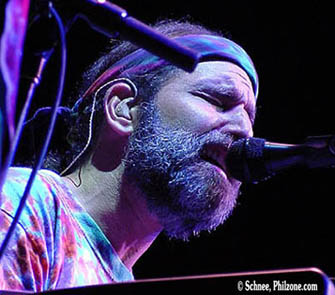INS
& OUTS
ROB
BARRACO
© 2004
www.philzone.com
and
www.2012productions.com
Conducted January
24, 2004
Click Photos for bigger versions in a new window
Hear samples with free
RealPlayer
Philzone.com: At what point did you realize that playing with Phil and
Friends was more than just a good gig, that it was something that was
really special?
Rob Barraco: Probably about 30 minutes into the first rehearsal we did with Warren Haynes and Jimmy Herring. It was the Fall 2000 tour. We started rehearsing I believe in the end of September. We started playing and about 30 minutes into it we all just looked at each other like, "Wow, what's going on here?" There was a level of communication that I had always dreamed about being involved with and we all knew it too!
Imagine here's Phil Lesh, who's one of the members of one of the greatest rock and roll bands of all time and you could see it in his eyes. Phil commented during some point of that 2000 Fall Tour that if anybody had told him that after Jerry was dead that he'd ever be in a band that was as good as The Grateful Dead, he would've laughed. [Listen to the following in RealAudio] Here he was in a band that was really making magic happen. So that's when I knew. And then - and Jimmy can back me up on this one - we did our first gig in Burlington, Vermont on that tour. And after the first set, Jimmy accosted me in the hallway. He goes, "Dude, we can't let Warren leave." Because the plan was that there was gonna be the one slot in the band that was gonna rotate - we would have different guitar players on each tour - and me, Jimmy and Molo were the core band with Phil. And Jimmy says, "We can't let Warren leave man." So we went up to Warren and said, "Listen man, you can't go! We've gotta keep you in the band!" He goes, "Well, I don't know, you know..." I guess we all let it be known that that's what we wanted and somehow, lo and behold, the universe just decided to grant this one little wish. The next thing we knew, Warren was a permanent part of the band. You know, you've seen it! You've heard it! It's the real deal!
It's a funny
thing how we had talked about Phil and how he likes to have these little
messages in the set and how he likes to tell a story. Well, at the last
Beacon NYC show on the Fall tour - the last tune that we did was Warren's
tune, "The Real Thing." I think that there were a couple of
dissenters out there because I think they wanted a Dead tune or whatever.
I guess what they weren't realizing is that Phil was telling them something.
It is - that band is the real thing. It's a vehicle for pushing
the envelope consistently. It's a great model for the stuff that I want
to do. I want to put it out there and keep pushing it higher and higher
until I drop.
PZ: Is there any song that you play with Phil and Friends that consistently
gives you chills, you know gives you goose bumps or anything?
RB: I don't think it's so much the songs as it is the stuff in
between the songs that constantly gives me goose bumps. I find myself
so consistently in the moment that sometimes when I'm jarred out of it
for no reason, it's absolutely scary. Before you know it though, I'm sucked
right back into it. Song-wise, I don't think that there's any one song
that does it for me particularly - so many of them do.
PZ: Most of the jams are mostly improvisational but for the Odyssey Summer Tour you had the "Planet Jams" which were actually somewhat rehearsed…
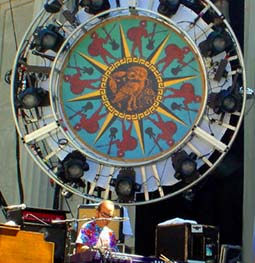 RB:
Phil wrote a whole slew of music to do this huge celebration of the ancient
planets. Phil wrote a theme for each of the planets and the sun and the
moon. We rehearsed them before that tour extensively because it was intricate
music and it was more open ended than you would think. There were no real
melodies per say; there were keys but the rest was just left up to chance.
Some of them were just phenomenal. I know Jimmy was a real big fan and
he keeps asking when we're going to the jams again. Phil says we're going
to do them again one of these days. You know, it wouldn't surprise me
if Phil would do a record based on that stuff some time in the future
and maybe work them so that they were real melodies and maybe Hunter could
write lyrics. It wouldn't surprise me at all. But I don't know what Phil
has up his sleeve.
RB:
Phil wrote a whole slew of music to do this huge celebration of the ancient
planets. Phil wrote a theme for each of the planets and the sun and the
moon. We rehearsed them before that tour extensively because it was intricate
music and it was more open ended than you would think. There were no real
melodies per say; there were keys but the rest was just left up to chance.
Some of them were just phenomenal. I know Jimmy was a real big fan and
he keeps asking when we're going to the jams again. Phil says we're going
to do them again one of these days. You know, it wouldn't surprise me
if Phil would do a record based on that stuff some time in the future
and maybe work them so that they were real melodies and maybe Hunter could
write lyrics. It wouldn't surprise me at all. But I don't know what Phil
has up his sleeve.
PZ: Besides those, you never would really try to plan jams that were structured, right?
RB: Oh no, no. Before we'd get on stage before first set would start, we'd talk about what groove we'd want to start with and what key do we want to do it in? We'd all make suggestions and it would be like, "Let's do that Miles Davis on the corner groove in E minor" or we would say E minor into B minor into D and that's going to lead us perfectly into G minor for the first tune of the set.
PZ: How about consistently opening the shows with a jam - where did that come from?
RB: [Listen to the following in RealAudio] My first tour with Phil the Fall of '99 when we were doing the thing with Dylan, it was the second or third gig on the tour, wherever we were, the security was so bad that people were just trickling in. When we got on the stage and there weren't that many people in the house and it was a sold out show. So we just started noodling, and as I recall, and this is not to pound myself on the back, I think I just started playing something I was just making sure everything was working and I just started doodling on the keyboard, and before I knew it, everybody was in it. And it lasted for 25 minutes and when it was done, and we went to the actual first song of the set, a lot of the people had finally gotten in. When we got off the stage, Phil was just like, "Now that was so cool that I was ready to just abandon the whole set and just jam the whole thing." It also became apparent that it was a great way to make sure people were getting in and getting settled so they wouldn't say, "Oh, I can't believe I missed that first tune…" And that became the norm after that - we did it every single night and it really works because it acclimates you to the audience, to the hall you're playing in and to your fellow musicians. And all of a sudden, when that first tune comes, you're there. Occasionally we'll just launch into the 1st tune in the set.
PZ: Yeah, I think that opening jam is something that the fans really enjoy.
RB:
Oh yeah, because there's so much magic that can happen in those moments
and they really set the pace for the entire night. I remember when we
were done with that tour and I went back 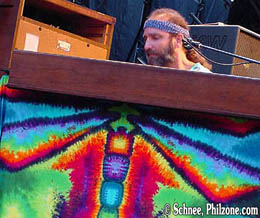 to
play with The Zen Tricksters, we started doing it. We really enjoyed it.
When Ratdog toured with us in that summer of 2001, I went to go see them
at Jones Beach after my tour wrapped up and that's how they were starting
their show. That really cracked me up! I thought, why didn't anybody else
think to do this? It's a great way to start a show. Well, I'll tell you
what, Miles Davis was doing this to start a show in 1967. (laughs) The
difference between their thing and our thing is that Miles' was much more
structured than ours. Our thing is just constantly morphing and moving.
One of my friends - a drummer that I've known for my life - he said, "Sometimes
you morph too quickly for my tastes. I just get into a groove you're doing
and the next thing you know, you're off somewhere else." I said,
"You can't control this beast. You can't. It has a mind of its own.
It just goes where it wants to go."
to
play with The Zen Tricksters, we started doing it. We really enjoyed it.
When Ratdog toured with us in that summer of 2001, I went to go see them
at Jones Beach after my tour wrapped up and that's how they were starting
their show. That really cracked me up! I thought, why didn't anybody else
think to do this? It's a great way to start a show. Well, I'll tell you
what, Miles Davis was doing this to start a show in 1967. (laughs) The
difference between their thing and our thing is that Miles' was much more
structured than ours. Our thing is just constantly morphing and moving.
One of my friends - a drummer that I've known for my life - he said, "Sometimes
you morph too quickly for my tastes. I just get into a groove you're doing
and the next thing you know, you're off somewhere else." I said,
"You can't control this beast. You can't. It has a mind of its own.
It just goes where it wants to go."
PZ: Were you all equally responsible for taking a jam to the next place?
RB: Sometimes I think we all just look at each other and laugh like, "How the hell did we get here?" And you know, sometimes one person is responsible and probably on listening back to tapes, you can often hear that moment when it went to that place. Phil might've played something or any of us could've. I know that on one particular night - and I couldn't possibly tell you where or when it was - I do recall playing and got this intense feeling to smack this crazy chord and it completely shifted the band into this completely crazy different thing. I remember that I got off the stage and made a mental note of just how powerful that is. To actually have that moment where you realize that you moved the whole band. Wheehew! You don't want to constantly be thinking about those types of things, (laughs) but it just happens. That particular night it just killed me.
PZ: Were you surprised when the talk started about the reformation of The Dead?
RB: Nah, I always figured there would have to be a time. Think about any of these other bands, somehow you always figure they've gotta get back together. When they don't get back together you've gotta scratch your head. When The Allman Brothers broke up, you always knew that they'd get back together. When Led Zeppelin broke up, you knew they'd get back together. The one band I'm waiting for that's going to come back… Cream. I just know that it's coming. In the next two years I guarantee that Cream comes back. I wasn't shocked with The Dead. I thought it would be a really cool thing.
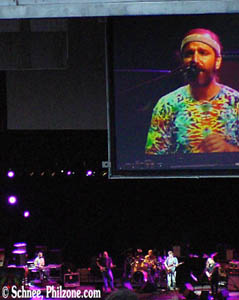 PZ:
Were you offered the gig right away?
PZ:
Were you offered the gig right away?
RB: Pretty much.
PZ: What was your initial reaction?
RB: I was deeply, deeply honored to be a part of it. Now, I knew as soon as they said that there would be a reunion, I knew there'd be a tour to follow. I just didn't think it would be as soon as that Fall. I thought it would be the next summer or something. You know?
PZ: Was that sort of a let down that it was Other Ones that fall and not Phil and Friends?
RB: I guess on some level, yeah. I had grown so accustomed to doing that Phil Lesh and Friends thing and I felt like, "This next tour, God knows where we're gonna to go." It seemed very sad to me that when we played the Red Rocks shows in 2002 I was pretty convinced that Phil Lesh & Friends would never play another gig. I had even asked Phil at one point, "When's Phil Lesh and Friends going to play again?" He said, "Oh, we'll play again but I don't know when." I figured he was just being nice and didn't want to let me down.
PZ: That must've been like a dagger in the heart to hear that.
RB: Well, of course - to all of us - to everybody. I remember when we played that last gig and it was like, "Wow, maybe it's not going to happen again." I think we were all disappointed that it had seemed to come to an end.
PZ: It must've seemed premature, no?
RB: Of course. In retrospect you can't stop the freight train from coming down the tracks, and that's what The Dead is like. It's an unstoppable thing. Now, I'm no longer on the train, but it's got a life of its own. It's gotta play its thing out now. I don't know that Phil Lesh and Friends will ever play again, but I'm really hopeful that it will. When I was told last summer that Phil Lesh and Friends was going on tour this past Fall, I couldn't believe my ears. I was so overjoyed.
PZ: We all were!
RB: Yeah, but it just took me by surprise. [Listen to the following in RealAudio] "Whoa, we are? Jumpin' Jehosaphats!" And that tour just ripped it up. It was almost like that band never stopped playing. It got better!
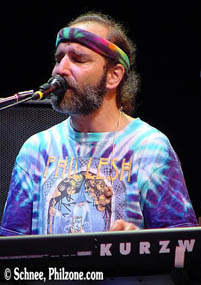 PZ:
Did you have any stand outs from last Fall's tour?
PZ:
Did you have any stand outs from last Fall's tour?
RB: Saturday night in Philadelphia. But even the Warfield shows that we did in September - we came right out outta the gates and took no prisoners. We ripped the roof right off the Warfield. The Denver shows on that tour were incredible. The opening shows of that tour were great. The only shows for me that didn't seem to have the same fire were the Chicago shows, and that was a personal thing because I was absolutely devastated by the flu, but still those shows were still good. Boston was awesome. We did some different things with the sound at the Orpheum.
PZ: How's that?
RB: Usually they would hang the PA stacks behind the proscenium and by doing that, the band always had to play almost against the back wall of the stage and we were very, very far away from the audience. Because they were hanging back there - the PA speakers - it also created a huge bass pocket on the side of the stage so it was really hard to get the sound right. I've been told that the sound was always pretty miserable. Well, this time they stacked the speakers on the stage and we were actually able to move up closer to the audience and it sounded phenomenal in there.
PZ: That had to make a big difference in your playing.
RB: It most certainly did. I love the Orpheum - a lot! - it's one of my favorite places to play. It's really special. Then we moved to Philly and right from the beginning of Philly, the band had just finally reached its stride and we just hit every note. Especially that Saturday night. They were just all great. Then we got to the Beacon. There's always going to be the best. I don't think that those Beacon shows were as good as the Philly shows, but they were just great. It's also subjective for me. On any given night, one guy's great show is another guy's nightmare. Who's to say? It's the same with the audience too. [Listen to the following in RealAudio] I went to enough shows in my life, all different kinds of bands and stuff and I know that you never really know. You're affected by your own moods, by your own elevation and by the sound - where you're sitting. You know one of the best sounding shows I've ever heard in my life was Nassau Coliseum seeing Led Zeppelin sitting behind the band. It sounded so great. It was like heaven back there. And we snuck out and got into the front. They had a front section of seats and then there was an aisleway and then the next section which was where the soundboard was - we were kneeling down in the middle and it sounded like shit. It should've sounded like GOD, but it sounded like shit. I was like, "I'm going back up to the rafters." It's got a lot to do with those things, you never really can tell. So that's my synopsis of the fall tour. For me, it was one of the best musical moments of my life.
PZ: Well, we hope that you're going to get another surprise call and Phil and Friends will be back playing this fall.
RB: Well, I'm going to be really hopeful, but I'm not going to hold my breath. I hope the same thing. I hope I get that call during the summer…."Guess what?..." (laughs)
PZ: Getting back to The Dead, did you have any initial reservations playing with another keyboard player?
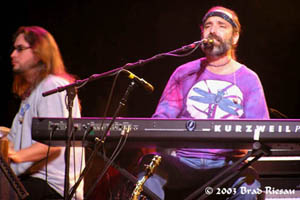 RB:
I wondered how it was going to work. I had never played with another keyboard
player. Very rarely have I ever been in a situation where I was sitting
in. You know, I sat in with The Allman Brothers, you know playing with
Greg that was different. Jeff Chimenti and I are from very similar schools.
He's a really great Jazz keyboard player and that's where I'm coming from
too. As jazz is, we tend to play a lot. (laughs) Jeff and I really had
to work it out to make it sound alright.
RB:
I wondered how it was going to work. I had never played with another keyboard
player. Very rarely have I ever been in a situation where I was sitting
in. You know, I sat in with The Allman Brothers, you know playing with
Greg that was different. Jeff Chimenti and I are from very similar schools.
He's a really great Jazz keyboard player and that's where I'm coming from
too. As jazz is, we tend to play a lot. (laughs) Jeff and I really had
to work it out to make it sound alright.
PZ: It must've taken a conscious effort…
RB: Well, it did. Every night we talked about the set and we looked at the setlist and we worked really hard to split it up so that it worked. It was a learning curve in the beginning. I know we played a lot more together on the Other Ones Fall tour (2002) as far as us being up there at the same time. I think that prompted the changes that happened this Summer where we actually split it up. At first we took the entire repertoire and divided it up.
PZ: That must've been a little tough.
RB: Well, you know it was like, "Well, you know a lot of these Bobby songs, and I know a lot of these other songs so you take these and we'll split the rest up." That didn't really work because one night one guy could play a lot and the other one wouldn't really play at all. Jeff and I finally agreed that it didn't matter what tunes there were, we'd just divide it up equally. You know what worked? I think both of us had a lot of respect for each other. We became really good friends. Jeff is one of the nicest people I've ever met in my life, just the sweetest guy. He's just a tremendous musician. I hope he feels the same way about me. (laughs) Jeff, Jimmy, and I were inseparable on the tour. We just became the best of buds and that's really what made it work. We commented many times how lucky we were to have that.
PZ: After enjoying you sing leads on many songs with Phil & Friends, many fans were bummed that you barely got a chance to sing lead with The Dead…
RB: Well, Bob really wanted to sing those songs. As much as I love singing those songs, who am I to argue? After all, I got to sing so much with Phil & Friends. Bob had as much to do with those songs that Jerry wrote as anybody. They all shaped those songs. Back when those songs were written, they were collaborating. Jerry would bring a tune into the studio that was partially done, or Bob would bring a tune into the studio that was partially done. I mean have you ever heard those tapes of the old "Sugar Magnolia" when it's the same verse just over and over again? The lick in the beginning of it is very different….or the old "Berthas?" These are things that each of them would bring these little signatures to, so they became as much of a part of writing them as the actual writers. I think that Bob can lay claim to all of those Jerry tunes, and he has the right to. I mean, who am I to get pissed off that I can't sing "Bertha?" I mean, if Bob wants to sing Bertha, Bob can sing Bertha. That's fine by me…
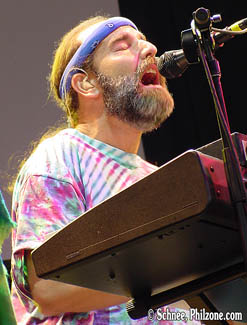 PZ:
But, didn't you feel that you should be able to sing at least a song per
show? It's obvious to many of us that you certainly aren't lacking the
chops.
PZ:
But, didn't you feel that you should be able to sing at least a song per
show? It's obvious to many of us that you certainly aren't lacking the
chops.
RB: Well, you know…it's not a matter of my ability to sing, it's a matter of focus on the principal guys in the band. It's their band. I think I might be going out on a limb for saying this, but I don't mind saying this - in Phil Lesh and Friends, I feel like an integral part of that band. All five guys in that band are very important to what that band does. The Dead, as opposed to the Grateful Dead, is really about those four guys. I got into it thinking all of a sudden, "I'm in The Dead and I want to be an integral part of it. I want to be a contributor." But, I never really felt like I was; I always felt like I was a side man. There's nothing wrong with that. It would be like being in The Who. If you were a keyboard player in The Who you're always going to be a side man. I think the only keyboard player who could step into that situation and not feel like a side man would be Bruce Hornsby.
PZ: Right. So you accepted it out of respect...
RB: Sure. I have absolutely no regrets at all. Sure, when it became apparent that I wasn't going to sing anymore, maybe the ego in me was a little hurt. I got over it really quick. It was never a really big deal. You know, I don't need to sing and really, I feel like I just need to do whatever I need to do to make it as great as it could be.
PZ: Well you sure did one hell of a great job at that.
RB: Well, thank you man. I really appreciate you saying that. That's really part of my mission.
PZ: And I think you still added such great harmonies to those songs and I think that's what a lot of people are really going to miss.
RB: Thanks. There was some great, great singing, in particular in songs like "It Must've Been The Roses." I think Joan, Bob, and I really ripped that song up. There were a lot of good harmony parts and even before they decided to get a female voice in the band, I felt that me, Phil and Bob were really, really good. A lot of people have commented to me personally that "Wow. That really sounded like the Grateful Dead." I guess they had a different vision for this particular band.
PZ: What were your impressions about playing with the rest of The Dead. You know you have the "Fab Four" together.
RB: [Listen
to the following in RealAudio] Very,
very different than I ever imagined it to be. When I first played with
Phil, the very first rehearsal I ever went to, it took me by surprise
because playing with him in the moment was so different than me listening
to him for all those years that I almost didn't dig it at first. [I thought,]
this is nothing like I thought it was going to be and then all of a sudden
I realized - once I embraced it - how awesome it was to play with a guy
like Phil and play with guys at that level.
PZ: I think some people felt like the music was being pulled in
a lot more different directions with The Dead...
RB: Let's remember that here you have this band that's been around for 30 plus years and then you throw players in there that have been doing all sorts of different and diverse things, like Jimmy and me - even though I've played a lot of Grateful Dead music in my life, I've also done a lot of other things. I've had a lot of other influences, like with jazz and the same thing with Jeff. So again, here's a band that preaches being in the moment, so all of these influences are going to come together and I think that any band's gotta go through a learning curve when they first play together, so even though those guys have played together for so long, it's like being in a brand new band. This is a very subjective thing to say because it's only my perspective; I think that the band finally gelled at Red Rocks in the summer time last year. After having done the reunion, the whole fall tour, and the whole first leg of the summer tour, those Red Rocks shows were when the band finally learned how to play together as a band.
PZ: Do you think it was the highlight of the tour?
RB:
No doubt. I think that others in the band would agree that those shows
were really special and it's got to do with many, many factors. One being
that it's Red Rocks! Whew! That place has 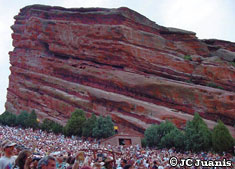 a
whole other kind of magic going on. So you know, for me that is where
it all came together. It would take years, and years of playing - if you
listen to The Dead in '66, '67, '68, they're going through all of these
changes, but the band hasn't really gelled. Now, remember that this is
subjective. This is what I think. 1969 was the first year for me listening
to all the tapes I've listened to where they finally came together as
a band. Those Dark Stars in 1969 were masterful. The band finally realized
its own power and was able to finally harness it. The same thing with
this band. I think it's unfortunate that the line up has changed all of
a sudden, because I think that given another year, it finally would've
gelled. Now, it's got to go through a learning curve again.
a
whole other kind of magic going on. So you know, for me that is where
it all came together. It would take years, and years of playing - if you
listen to The Dead in '66, '67, '68, they're going through all of these
changes, but the band hasn't really gelled. Now, remember that this is
subjective. This is what I think. 1969 was the first year for me listening
to all the tapes I've listened to where they finally came together as
a band. Those Dark Stars in 1969 were masterful. The band finally realized
its own power and was able to finally harness it. The same thing with
this band. I think it's unfortunate that the line up has changed all of
a sudden, because I think that given another year, it finally would've
gelled. Now, it's got to go through a learning curve again.
PZ: What's your take on Joan Osborne and what she gave to the band?
RB: First of all I just want to say for the record, that when Joan first came on board she was a tremendous professional. She came on and she had done her homework like nobody's business and came to those first rehearsals kickin' ass. She was a real trouper because it's such a vast repertoire. I worked with her every single day on the Summer Tour working on new material that they wanted to do that she didn't even know, that she hadn't even heard before. They were like, "We're going to do this song and you're going to sing it tonight Joan." We were like, "What? Okay Joan, let's get in that rehearsal room." She was always willing to do it. I think that she brought back to the band something that was probably missing since Pigpen [Ron McKernan] but in a different way.
PZ: : So you equate her more with Pigpen than say the obvious, Donna Jean Godchaux?
RB: No, forget Donna. I'm not dissing Donna. Donna was there specifically as a backup singer. [Listen to the following in RealAudio] Joan was nobody's backup singer. That woman has got such incredible power and when she was struttin' her stuff, she was the sexiest woman alive. She really had a hypnotic power about her. Now, again it's one of those things if she had stayed with the band, God knows what would've happened. She was just starting to feel her oats and the guys in the band seemed like they were really into it. They were really encouraging her to go out there and take chances. They're not used to that. Not for a long, long time - not since Pigpen. He was the last person who took that band by the horns and said, "Hey we're gonna do it my way!" That's kind of how Joan did it. I thought it was a very cool thing.
PZ: I think that's quite a compliment to pay her.
RB: I'm not quite sure how the fan base took to Joan initially. I think they were like, "Wow. What the hell is this?" I think that by the end of that tour, a lot of people were embracing her. By the New Year's show people were loving her.
PZ: I think that there were some standouts, but I think in general once the holdouts got used to her…
RB: I think that most people find change a difficult thing to absorb, and change is a difficult thing. You have to let go of your own ego when change happens. You have to open your heart. Really, what's the Grateful Dead been about all of these years? They're all about change. When the band became stagnant in the late '80's and '90's - in my estimation aside from those Bruce Hornsby shows - the band stopped growing. You know? That band was always about change - they always reinvented themselves. Okay, after '69, after those incredible Dark Stars, the band reinvented themselves as some New Age cowboy band, or whatever - Workingman's Dead and American Beauty - and then they moved on from there. Pigpen passed away and they reinvented themselves even further. That's what it's always been like for this band.
PZ:
What was the camaraderie like behind the stage?
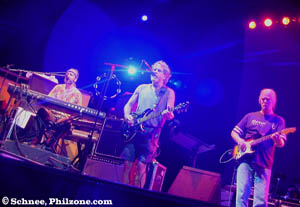 RB:
Oh, just wonderful. I can't say enough about these guys. Well, on the
Fall Tour I was on a bus with Jimmy, Jeff and Bob. It was a great thing
to get to know Bob. He's a real character! I really loved hanging with
him. Everybody got along really well, but everybody got along better on
the Summer Tour. There was a lot of camaraderie between the four guys
and between all of us. It was really special.
RB:
Oh, just wonderful. I can't say enough about these guys. Well, on the
Fall Tour I was on a bus with Jimmy, Jeff and Bob. It was a great thing
to get to know Bob. He's a real character! I really loved hanging with
him. Everybody got along really well, but everybody got along better on
the Summer Tour. There was a lot of camaraderie between the four guys
and between all of us. It was really special.
PZ: Were many points where the guys would reminisce about the old days?
RB: Of course, constantly, and having been around Phil for four and a half, going on five years…
PZ: Did you ever have any burning questions that you finally got answered?
RB: My burning question got answered in the first week of rehearsing with Phil. My question was how he got the weird sound on the Aoxomoxoa album during the St. Stephen during the Lady Fingers part and Phil finally told me and I was floored. [Listen to the following in RealAudio] He used an old silver dollar. You know the old silver dollar had the ridged edges. It almost sounds like it is talking [Rob imitates the sound] and that's how he did it. That was the one question I had that I just had to know. It was great! I was like, "Wow, this is excellent!" There wasn't that much that I really wanted to know. I found out more than I ever really wanted to know.
PZ: On to the new tour being announced - Joan and you were out of the band. Was that a surprise? Would you care to dispel some of the rumors surrounding your departure from the band? We know you didn't sleep with Joan or piss off Bobby...
RB: All of those rumors crack me up. I've been staying away from reading about stuff because I'm trying to change my focus. I can't dwell on these things. I got an email from a friend in California and she said, "What's with all of these rumors? I hear you have a flare up of Hep C, you had to leave the band and you're with Joan now!" I just thought, "WHAT?" That's when people really started telling me what was being said out there. My kids stepdad was the one who really cued me into all of the stuff that's being said and I just laughed. (laughter) Now, I know that a lot of it is just people joking around, but none of that stuff is true. I don't have flare up of Hep C. I'm in the best health I've ever been in. Joan and I are not an item and Joan is not a lesbian. (Laughter)
PZ: So, were you surprised to be out?
RB: Yes, it was a bit of a shock to me. I can't say that I was exactly pleased. Given the set of circumstances by bringing Warren Haynes in, I understood it. I understood that I'd be the odd guy out because there was always a nice balance - you know, Phil brought in some of his guys from his band and Bobby brought in Jeff Chimenti. Now you'd have a band that would have 3 guitar players, 2 keyboard players, and 2 drummers. You'd have three guys from Phil's band and well, I guess it just makes more sense. The band only really needs one keyboard player.
PZ: So you took it at face value. You didn't try to fight for it or anything?
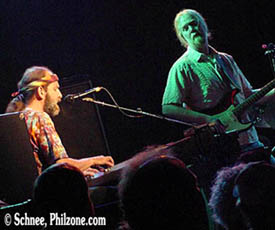 RB:
How could I fight? If I've learned one thing from that organization, when
they make decisions - that's it. What are you going to fight for really?
There are a lot of things going on in that scene. There's the band and
management. There's a lot of stuff swirling. How do you fight for something
like that? My whole life has been such a trip and it's all been about
the journey for me. I never really cared that much about the end results
of things. It's actually living through it that's really valuable. That
first night for me was really uncomfortable. I just couldn't believe I
wasn't in The Dead anymore. I mean, Jesus Christ! The thought that kept
going through my mind was that I'd miss playing with Jimmy, and Jeff and
being around all of these guys all the time and being in the scene.
RB:
How could I fight? If I've learned one thing from that organization, when
they make decisions - that's it. What are you going to fight for really?
There are a lot of things going on in that scene. There's the band and
management. There's a lot of stuff swirling. How do you fight for something
like that? My whole life has been such a trip and it's all been about
the journey for me. I never really cared that much about the end results
of things. It's actually living through it that's really valuable. That
first night for me was really uncomfortable. I just couldn't believe I
wasn't in The Dead anymore. I mean, Jesus Christ! The thought that kept
going through my mind was that I'd miss playing with Jimmy, and Jeff and
being around all of these guys all the time and being in the scene.
But, you know about two days later I was like, "Okay, what do I do now? It's time to come up with some kind of plan." I immediately wanted to get into my own thing. It's the next logical step for me as a musician. I've been writing these tunes with Hunter and other stuff and I need to play this music. It has to be played. So I started making some calls to see if there were musicians out there to see if there that really wanted to start doing something. I have phoned a couple of musicians who really want to do something.
PZ: So what's in the works for you next then?
RB: I am working on an independent record deal with a label which will remain anonymous for the time being until it's a done deal. In the meantime, I'm going to record the CD in New York. I'm going to use some great musicians on it. I've got some really wonderful, wonderful music that I've penned with Robert Hunter and some other stuff. It's going to be an album that's really focused on songs as opposed to jamming. It's going to have some really cool instrumental sections to some of these tunes and there's going to one instrumental on this record too.
PZ: Now this is a composed instrumental as opposed to a freestyle jam?
RB: Yeah, there are lines and stuff. I want to leave the heavy improv thing for the live band. I'm going to put together a band that's going to go out and play live this year. I couldn't tell you when that's going to happen. My main focus is on this record at this point.
PZ: Are you thinking about anyone in particular?
RB: Yeah. Two guys that I know for sure are Barry Sless who has played in the past with David Nelson Band. Barry is a great guitar player and a tremendous pedal steel guitar player. I love the pedal steel and I really want that instrument in a band and this is my way to get both. The other person that's going to be in the band is a longtime friend of mine named Rob Friedman. He's a New York musician, tremendous composer, great producer and I hopefully am going to get him to produce the record. Those are the two that are definite. I'm toying with other people but nothing is jumping out right now.
PZ: You mentioned your collaboration with Robert Hunter. What was the creative process like in writing songs with him? What a special thing!
RB:
[Listen
to the following in RealAudio]
I approached him at a Greek show that we did
a couple of years ago. His dressing room door was open and I just popped
my head in and introduced myself. And he goes, "I know who you are."
I was like, "Oh cool" and we were 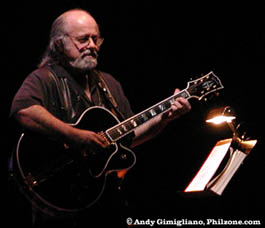 talking
just a little bit about some stuff. And then I said, "You know, I
want to ask you, I've got a couple of tunes…" He looked at me
and he said, "Say no more, just send them to me." He gave me
his address and after tour was over I went to my then girlfriend's house
in Portland, Oregon and I had a keyboard set up there. I had just gotten
my Apple laptop and I had my Pro Tools set up, so it was like a little
exercise for me to learn how to use the Pro Tools - I had to get these
tunes down. So I put three tunes down. I played a piano part, a keyboard
bass part and then I hummed a melody and I sent him the three songs. I
called him up at some point and we emailed once or twice. I called him
up and said, "I'm gonna be in California on this week and I wanted
to know maybe I could stop by and see how you did with the songs."
He said great. So I went and met with him and he handed me these sheets
of paper and on them were these lyrics and I looked at the lyrics and
he had them in the order that I had given him the songs and I was just
blown out of my socks at his brilliance. I mean he fit the moods of the
tunes perfectly. He fit the melodies like a glove.
talking
just a little bit about some stuff. And then I said, "You know, I
want to ask you, I've got a couple of tunes…" He looked at me
and he said, "Say no more, just send them to me." He gave me
his address and after tour was over I went to my then girlfriend's house
in Portland, Oregon and I had a keyboard set up there. I had just gotten
my Apple laptop and I had my Pro Tools set up, so it was like a little
exercise for me to learn how to use the Pro Tools - I had to get these
tunes down. So I put three tunes down. I played a piano part, a keyboard
bass part and then I hummed a melody and I sent him the three songs. I
called him up at some point and we emailed once or twice. I called him
up and said, "I'm gonna be in California on this week and I wanted
to know maybe I could stop by and see how you did with the songs."
He said great. So I went and met with him and he handed me these sheets
of paper and on them were these lyrics and I looked at the lyrics and
he had them in the order that I had given him the songs and I was just
blown out of my socks at his brilliance. I mean he fit the moods of the
tunes perfectly. He fit the melodies like a glove.
PZ: He's a master.
RB: I hardly had to do any editing to make them fit.
PZ: What about your intentions for the lyrical content - had you just given him the feel of the music and that's it?
RB: I don't even think that he would take suggestion on lyrics. I think he lets the song speak to him. I would never presume and give him any kind of suggestion. One thing that he did say to me right from the very beginning was, "please do not be shy with me about how you feel about lyrics. I will not take it personally, so if anything doesn't hit you right and you want to rewrite or fix anything, just please be honest" - and so far so good. That day I asked him, "well, how adventurous are you feeling because I've got another three tunes." He said, "Well, lay it on me." I handed him a CD and I went home and he started emailing me over the course of three days lyrics for the other three tunes. I was just blown away!
You know, I consider myself one of the luckiest people I know because I've gotten so many of my dreams fulfilled, so many of the things that I set out to accomplish in my life, I've got to do. Playing with Phil Lesh and Friends was one of the biggest dreams, because I got to actually play in a band, and like what we were talking about before where all the members are really communicating and there's really no weak link. So that was a big deal. But writing with lyricists, I've always known I'm not a great lyricist - it's just not my thing. Music comes naturally to me, but lyrics are forced and I've always pretty much given my stuff to other lyricists. I've always dreamed about working with a lyricist of the caliber of Hunter, but never did I think that I'd ever get the chance to actually work with him. That's probably the biggest dream come true. So we will continue to write, I guess, as he has the time. He's busy writing for himself as well so that will always come first and I really respect that. I have a new tune that I just finished writing the other day that I can't wait to give to him. I am really excited about this one.
PZ: What was the inspiration for that one?
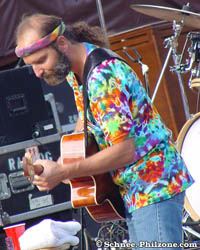 RB:
Well the inspiration for that - when I used to live with Jeff Mattson
from the Zen Tricksters, I always had Jeff's guitars around. I could always
pick them up and play and I write differently on guitars than I do on
pianos. It's like cheating on your wife. A friend just recently lent me
an acoustic guitar - I have a bass in the house but not a guitar - little
does he know he's not getting it back (laughs). Anyway, the first day
that I sat down with the guitar it yielded magic to me. I came up with
this tune and within a couple of days I had gotten it down on pro tools.
I recorded the guitar part first. Then I put an upright keyboard bass
sound that's really cool. I then added a piano track to it. It sounded
really cool. The whole structure of the tune and then little bits and
pieces of the melodic ideas and then one day I was just sitting there
and the melody just sang itself to me. I plugged it into the computer
and now I'm going to leave it up to Hunter to make some magic with it.
I'm psyched about it.
RB:
Well the inspiration for that - when I used to live with Jeff Mattson
from the Zen Tricksters, I always had Jeff's guitars around. I could always
pick them up and play and I write differently on guitars than I do on
pianos. It's like cheating on your wife. A friend just recently lent me
an acoustic guitar - I have a bass in the house but not a guitar - little
does he know he's not getting it back (laughs). Anyway, the first day
that I sat down with the guitar it yielded magic to me. I came up with
this tune and within a couple of days I had gotten it down on pro tools.
I recorded the guitar part first. Then I put an upright keyboard bass
sound that's really cool. I then added a piano track to it. It sounded
really cool. The whole structure of the tune and then little bits and
pieces of the melodic ideas and then one day I was just sitting there
and the melody just sang itself to me. I plugged it into the computer
and now I'm going to leave it up to Hunter to make some magic with it.
I'm psyched about it.
PZ: Were there any other songs for the upcoming album that you were particularly inspired by something?
RB: One song that's going on the record is called "Old Coast Highway" and the music for the song was completely inspired by this woman Julie, my soul mate. Every note of that song is inspired by her. It's funny because that doesn't happen to me a whole lot. I have very, very few times in my life where I have written songs for people. That song completely yielded itself from her. I always cherish that melody and Hunter's lyrics to that song are simply breathtaking.
PZ: We're highly anticipating this and I think a lot of other people will to.
RB: You know, it's hard for me to be objective about my own stuff - I can't judge it. I don't know what people will think of it but I can say they are real labors of love for me and Hunter's lyrics that he laid down for this record are just nothing short of masterful. One of the songs that I wrote with Rob Friedman, one of the guys that we just spoke about that will definitely be in the band and on the record, is called "When We All Come Home." That tune's a very special tune for me. I wrote that tune, I forget where I was, but I was feeling incredibly lonely and that song poured out of me as a means to uplift myself. I needed something to pull me out of this lonely thing and this tune just had such a hopeful vibe to it. So I sat down with Rob Friedman and I wrote some lyrics and the chorus was "when we all come home." It was just about how people just long to be with their loved ones just so much and a lot of times we're torn away from these people. I wanted this song to express that, and like I told you I'm not a great lyricist (laughs), so Rob and I sat down one day in my house and I played him the tune and showed him the lyrics. He just made some suggestions and the little subtle things that he changed in that tune just made that song so powerful. Then he helped me rewrite the lyrics and they're really beautiful. They've taken on a whole new meaning because since I wrote that tune and those lyrics we've had a lot of tragedy and war.
PZ: So it's even more reflective than it started out to be?
RB: That's right. I'm sure people will recognize that immediately in the tune. You know too, some of the instrumental sections in the tunes are pretty cool. One tune is inspired by a thing that Phil Lesh and Friend's played back a couple of tours ago. It's a lick that John Molo and Phil came up with and I wrote a tune around it. It was really cool because I had this idea to do a tune in 5/4 because the lick was in 10/10 and it really seemed to fit well. So I played it a whole bunch of times and I came up with a melody for it and I gave it to Hunter. Hunter comes back with these unbelievable lyrics and I'm sitting there trying to record them and I can't sing the lyrics! They go by so quickly because there's so much of it and I couldn't change one damn word.
PZ: Geez, that's a challenge!
RB: I had to slow the tune down to a snail's pace just to make that work and it was way too slow. What I was forced to do was to write the song in 6's instead of 5's, and much to my surprise it completely changed the tune in a new and positive way. The verses came out to sound a little more Brazilian than I could ever imagine, but the lyrics are heavy - definitely born out of the times we're living in.
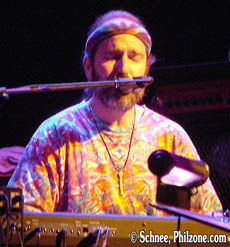 PZ:
Very cool. So you're planning on putting this touring band together so
what can the fans expect from that?
PZ:
Very cool. So you're planning on putting this touring band together so
what can the fans expect from that?
RB: As soon as I'm done with the record, my focus will be on putting the band together and I'm hoping - I know this is being extremely optimistic - that sometime in the spring but probably more like the summer time or the fall. Besides the fact that we'll be playing a lot of the music that I will have on this record, plus a lot of music that will not appear on this record, I'm also going to choose some really cool cover tunes that I'd love to play. I'm playing around with a bunch of Jethro Tull tunes that I absolutely love and a Paul Simon song that I thought is killer…
PZ: Which Paul Simon tune?
RB: "Boy in the Bubble." I love that Bob Dylan tune, "Ring them Bells" and I'm working on a little more upbeat version than his. That song just slays me. A couple of Beatles tunes too that I really love. I'm going to keep "I Am The Walrus," and "Strawberry Fields" because I have a certain affinity for these tunes. I'm also thinking of doing "I Dig A Pony." That's one of my favorites. So that's the kind of stuff I'm going to be doing and you can also expect a whole lot of jamming too.
PZ: Can we expect some Dead covers too?
RB: If I were to do any, none of them would be any of the popular stuff. I actually was toying around with King Solomon's Marbles because that's such a fun tune to play and being an instrumental makes it more likely that I'd do a tune like that.
PZ: What about a signature tune of yours like "Doin' that Rag?"
RB: Well actually I was thinking about "Doin' that Rag." I was thinking too about doing this great one groove thing that John Molo does. It's like this great pseudo-hip-hop thing. I was thinking that that tune lends itself so well to that groove. Instead of doing it the old Grateful Dead way to do it this way and supe it up a little bit. I wouldn't tinker with the melody or the chords or the a capella ending either. I don't know if I'll end up doing that. I want to steer clear of the Grateful Dead thing because of a couple of reasons. One is that I've just been doing that for so long that it's time for me to come up with my own voice. Also, Phil and Friends is going to be back one of these days and that's what Phil and Friends does. Besides that, The Dead is still here. You don't really want me to go out and play Dead tunes.
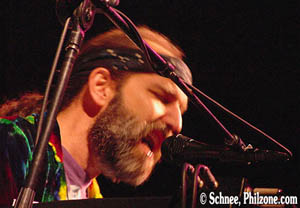 PZ:
But if the music is really as good as it sounds people are going to go
out and see it anyway!
PZ:
But if the music is really as good as it sounds people are going to go
out and see it anyway!
RB: I wouldn't have it any other way. I couldn't see myself go out and play anything that's mediocre. Let me put it this way, it's going to be the best music that I have the ability to play and maybe more than that because really…
PZ: Well, you have a newfound freedom now to really follow through…
RB: Absolutely, there's no doubt about that. I'm really going to take advantage of that. I'm really looking forward to playing for that audience. They've been nothing short of being incredibly kind to me and I really appreciate them and love them all for it. I want to give them something. It's like giving someone a part of your soul and I only hope that they dig it. One of the side benefits of being a musician is that you make people happy and you make them more of what they were before they came into the room. So they leave there with a new part of themselves, uplifted. I want to be a part of that. I want to uplift people. I want to make people happy and to make people dance and forget their troubles for that moment. I mean, hey, that's the mission!
PZ:
So where do you see your musical career ten years from now?
RB: Who knows man? Some of the dreams you don't even realize until
you're in it and done it. I don't know what I'll be doing ten years from
now, but I do know I'll be playing music.
Conducted
January 24, 2004 by Bret Heisler
Transcribed by Jennifer DeVincenzo
© 2004 www.philzone.com
and www.2012productions.com
All photos © Philzone.com.
All rights reserved.
.
